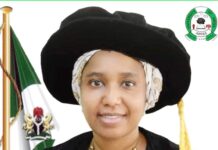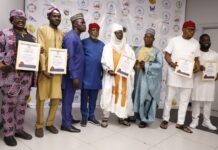Pantami: Why I Refused to do my PhD Program in Nigeria
The immediate-past Minister of Communications and Digital Economy, Prof. Isa Ali Ibrahim Pantami, has said that the delay he experienced during his Masters program discouraged him from pursuing his Doctor of Philosophy, PhD, program in Nigeria.
Narrating his experience in his book titled, “A Scholar’s Journey: Navigating the Academia,” presented to the public last week in Abuja, Pantami said that the absence of lecturers prevented him from acquiring a Masters degree in due time, despite gaining admission earlier.
The ex-minister, who was a Graduate Assistant (GA) at the Abubakar Tafawa Balewa University, in Bauchi State, during the time, with his colleagues spent five years (between 2003 and 2008) for a MSc program that would normally run for two years, according to the Nigerian education system.
Though, he still recorded success in his career, including a promotion to an Assistant Lecturer cadre, Pantami said such experience discouraged him from pursuing a PhD in Nigeria, even after he was offered admission to do so in Computer Science by the same institution.
“We got delayed at the GA level because since 2003-2005/2006, we could not start lectures for our MSc degrees, as we wasted much time because there were no lecturers to teach us.
“However, we were patient, knowing full well that patience could lead on to success. The challenges we faced were systematic and outside our control.
“After concluding our course, part of requirements for promotion, I became an Assistant Lecturer and continued to conclude my MSc thesis among other work after which I defended the thesis. Fortunately, I was successful and concluded my project defence in 2008. This was the time the university issued our MSc results.
“The university offered two of us admission for PhD program because our results were excellent. I began to ponder, that it took many years to conclude masters degree, due to no fault of ours but the system. What about a PhD? I believe a PhD could also be delayed for much longer.
Read Also:
“After much consideration and consultation, I applied for universities in the United Kingdom (UK) because they are one of the most successful countries to harness the value of 1st and 2nd Industrial Revolutions. I got admission offer from different universities but opted for Robert Gordon University, Aberdeen, Scotland, UK in 2010 due to the institution’s background in research, the same year I was promoted to Lecturer II,” Pantami added.
According to the digital economy expert, his career progression was recorded between 2007-2014. During this period, he taught different courses at both undergraduate and postgraduate level, while concurrently having his work published in International Journals.
Prof Pantami also revealed how a group of professors at the Abubakar Tafawa Balewa University (ATBU), in Bauchi State, played a crucial role in securing his first academic appointment in 2003.
According to him, some professors, impressed by his academic excellence and dedication to community service, persuaded the then Vice Chancellor, Prof. Abubakar Sani Sambo, to bring him back to the university after graduation.
“A group of professors led by my mentor, Prof. Bindawa, Alhaji Ali Deba, Prof. Abubakar Muhammad, and Prof. Ladan Shehu, convinced the university that my skills and commitment would fill a vital gap in crucial services, at ATBU”.
He went: “Without any ado, the VC, Professor Abubakar Sani Sambo, agreed and stated that his thoughts also aligned with theirs. Therefore, based on this noble gesture and recommendations by the group, I was offered an appointment at the university”.
In his memoir, Pantami also emphasized the importance for students to balance theoretical knowledge with practical skills to succeed in the labour market.
“At this point, it is worth noting that while industrial attachment is a good programme for students to learn new skills, it does not expose people to a sufficient level of requisite skills.
“For me, however, when I participated in the industrial attachment scheme, it helped me build the foundation for acquiring technical skills.
“Therefore, at the Centre, I also used the opportunity to help students who came for industrial training with us to learn similar skills I acquired in software and programming languages like Java, C++, C, and Pascal,” he said.
The former Minister also urged Nigerian tertiary institutions to prioritize practical skills courses during curriculum development to give practical skills and hands-on projects equal, or even greater, weight than theoretical exams.

















